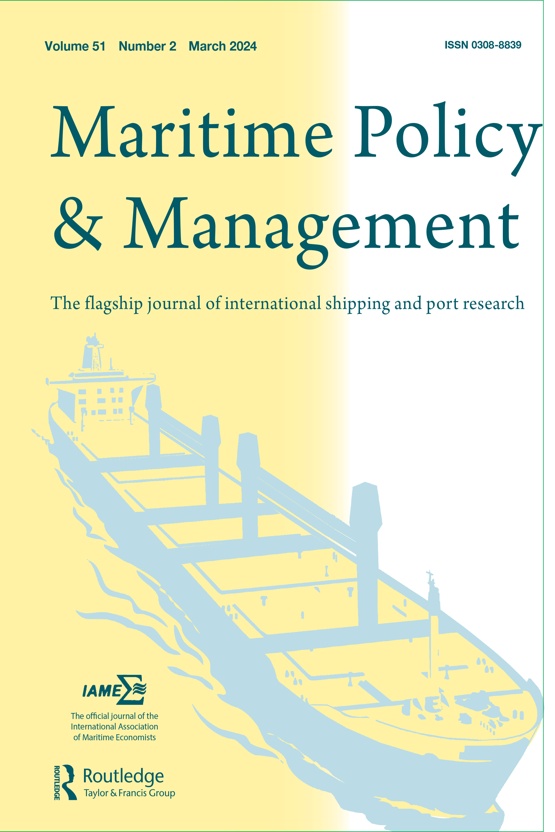Submit a Manuscript to the Journal
Maritime Policy & Management
For a Special Issue on
AI-Driven in Maritime Management
Manuscript deadline

Special Issue Editor(s)
Peng JIA,
Collaborative Innovation Centre for Transport Study, Dalian Maritime University, Dalian, China
jiapeng@dlmu.edu.cn
Dongxu CHEN,
Faculty of Maritime and Transportation, Ningbo University, Ningbo, China
chendongxu1@nbu.edu.cn
Haijiang LI,
Collaborative Innovation Centre for Transport Study, Dalian Maritime University, Dalian, China
haijiang@dlmu.edu.cn
Zhongzhen YANG,
Faculty of Maritime and Transportation, Ningbo University, Ningbo, China
yangzhongzhen@nbu.edu.cn
Xueqin Wang,
Chung-Ang University, S. Korea
xueqinwang@cau.ac.kr
AI-Driven in Maritime Management
Port and Maritime Security Management
- Risk identification and classification of port operations based on deep learning
- Safety risk identification and emergency decision-making under extreme conditions
- Conflict resolution for responsibility and authority between autonomous berthing systems and traditional pilotage regimes
- Maritime safety supervision based on computer vision and vessel big data
- Multimodal transport risk intelligent identification and anomaly detection
Intelligent Operation and Collaborative Governance of Port and Maritime Systems
- Intelligent collaborative operation strategies for large-scale heterogeneous fleets
- Intelligent scheduling and collaborative control of port production systems
- Resilience of port and shipping networks under emergency events
- Analysis of shipper behavior preferences based on machine learning algorithms
Investment decision-making and risk management in shipping
- Investment decision-making for ship emission control under policy constraints
- Coupled modeling of shipping derivatives pricing and market sentiment
- Shipping price index prediction driven by large language model
- Intelligent pricing strategies for multimodal transport
- Impact of extreme weather events on shipping insurance actuarial analysis
Emissions and Intelligent Regulation of Port and Maritime Systems
- Intelligent optimization of routes for fleets considering integrated energy systems
- UAV-based sniffing and deep learning-based source attribution of emission components
- Data-driven modeling and cost prediction of ship fuel consumption
- Emission reduction pathways and policy design for ports and shipping under multi-agent collaboration and multi-policy coupling
Crew Management and Nautical Education
- AI-driven educational pathway for crew skill transformation in autonomous shipping scenarios
- Edge computing and fatigue driving intervention mechanisms for EEG monitoring of seafarers
- Legal adaptability of crew manning standards and AI-assisted scheduling systems
- Text mining of social media for the identification of mental health risks among seafarers and early intervention
AI Ethics and Institutional Innovation
- Detection and correction policies for racial and cultural biases in maritime AI systems
- Intellectual property allocation and revenue sharing mechanisms for AI training data in the port and shipping sector
- Equity assessment of the diffusion of AI technologies in ports and shipping in developing countries
- Legal standards for algorithmic explainability in determining liability for autonomous vessel accidents
- Application boundaries of AI-assisted legislative tools in the revision of international maritime conventions
Submission Instructions
- Word limits:Follow the standard requirements of the journal.
- Timelines:Open for Submission: 31st of October, 2025;Deadline of Submission: 31st of May 2026
- Formatting preferences:Follow the standard requirements of the journal.
- Including but not limited to research papers, review papers, etc.These papers should clearly present their incremental contribution against related literature in the areas of shipping and port policy and management by clarifying (a) the importance of the issue addressed and problem solved, (b) the novelty and distinctive features of proposed methodology/models/approaches against published methods, and (c) the important findings/managerial insights drawn from analytical results.
- Our expected publication date is July 31, 2026

